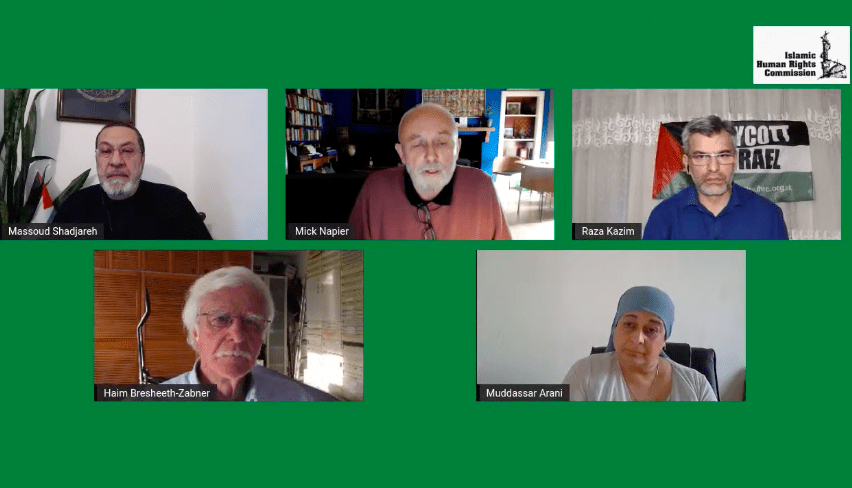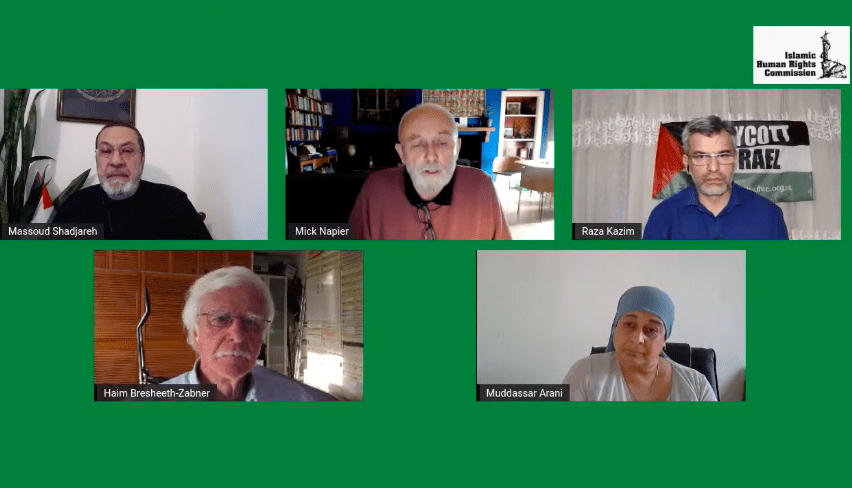Children have been targeted in schools for expressing solidarity with the people of Palestine. Several schoolteachers as well as some headteachers have threatened to discipline children if they continue to express that solidarity in any way. Chaired by Mick Napier (Scottish Palestine Solidarity Campaign), IHRC held a webinar of Thursday, 27 May with an esteemed list of speakers to deal with such issues and to empower the children and the parents involved by looking at the concerns from different angles including legal, human rights, academic as well as educational perspectives.
Speakers:
Haim Bresheeth (author and academic)
Massoud Shadjareh (IHRC)
Mudassar Arani (Solicitor)
Raza Kazim (Teacher)
WATCH THE FULL EVENT HERE:
Haim Bresheeth (author and academic) was first to speak:
“What is the difference between anti-Semitism, which one no one should be practising because it is a form of racism, and anti-Zionism, which is the opposition to the war crimes of Israel? The government is trying to confuse those two positions; one is a form of racism, the other, anti-Zionism, is a form of supporting the human rights in Palestine.”
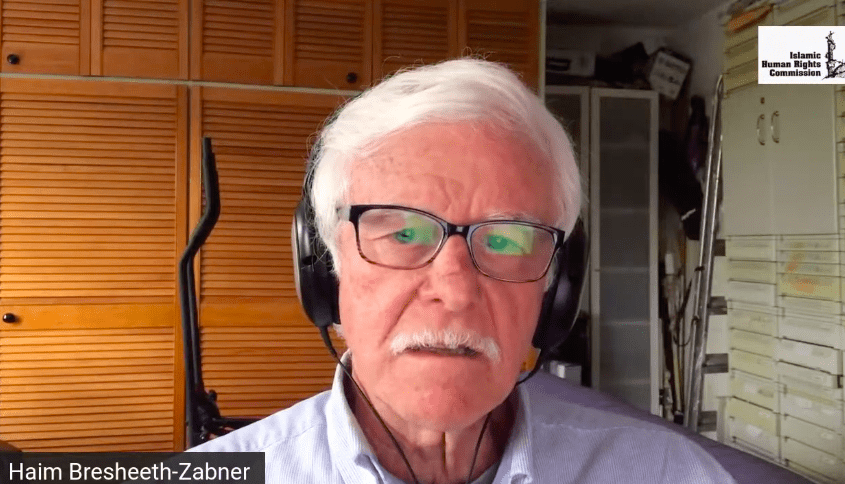
“We are told by the government that to criticise is Israel is anti-Semitic, which is bizarre… I am an Israeli Jew and I criticise Israel every day. The main paper in Israel, Haaretz, published today on its front page, the picture of all the children killed in Gaza, murdered by the Israelis. In Israel, apparently you can criticise the Israeli government in public, but in Britain you are not allowed to. There is no other government that you cannot criticise in Britain, but you cannot criticise Israel. This is bizarre and totally unfair. When children are suffering because they are calling for a free Palestine, all they are doing is calling for the human rights of the Palestinians. To equate the form of racism – anti-Semitism – with the critique of Israel is totally unacceptable. Anti-Semitism is the hate of Jews because they are Jews – it has nothing to do with Israel and should not be understood as anything to do with Israel, it existed for few hundred years in Europe, it doesn’t exist in the Arab world; it was not Arabs or Muslim that destroyed most of my family members together with 6 million other Jews, it was the Europeans, mainly Christians.
Israel did not act against anti-Semitism, for example, the best friends of Israel are anti-Semitic leaders of European countries; the leaders of Hungary, Slovakia, Austria, and Poland were related to racist parties – the best of friends. Israel does not have a problem with real anti-Semitism, Israel has a problem with people like us who criticise its crimes. The idea that this government is trying to stop us is especially bizarre, because who is this government? This government is led by a man who for 25 years has published article after article using racist language. For example, in 2005, Boris Johnson wrote in The Spectator, “to any non-Muslim reader of the Qur’an, islamophobia, fear of Islam, seems a natural reaction and indeed, exactly what text is intended to provoke”. So, this man that unfortunately runs the country, is telling us Islamophobia is a natural reaction. He has called black people “flag waving piccaninnies with watermelon smiles” and he compared Muslim women to letterboxes. In Johnson’s book, 72 Virgins, which unfortunately I read in order to know who the enemy is, there are facts that are totally racist on Muslims, Arabs, Jews, and Black people, and he says it is all in good humour. Like every racist, this is his defence.
We have a government that uses racist language, a number of people in government who use racist language and they are telling us we cannot criticise Israel because it is racist and anti-Semitic – this is a lie. It is a duty [to criticise Israel]… the International Criminal Court is investigating Israel for its war crimes in 2014, it cannot investigate earlier crimes because it only started after 2009. Hopefully people responsibly will be put on trial soon. So, we are not doing something that is not allowed, we are doing something that the ICC court is saying that we should be doing.
We should also discuss the daily apartheid which is a form of racism and genocide, against the UN Charter and a crime against humanity. If we educate children to speak against racism and apartheid, they should know Israel is running an apartheid regime.
When a child is sent home because they said ‘free Palestine’ or they are wearing a badge that says ‘free Palestine’, they are doing what is necessary, to speak against apartheid war crimes and the illegal occupation.”
Mudassar Arani (solicitor) discusses our rights to freedom of expression:
“Under Article 10 of the Human Rights Act, the freedom of expression is a right of every adult which includes the freedom to hold opinions, to receive or send information and ideas without state interference. Children too have rights. Under the UN Convention on the rights of the child, there is a legally binding international agreement, setting out the civil, political, economic, social, and cultural rights of every child, regardless of their race, religion and abilities. A child under Article 13 has the same rights as an adult under Article 10: the right to have and express their views and ideas, to talk about their ideas in writing or in art form and in every other form of expression. This makes it clear that it includes children and young persons, who are not yet adults. Every child or young person should be able to express themselves regardless of their religion or culture. The right of freedom of expression is not absolute; there are limitations set out under various legislations. Amendments to the Public Law Act 1986, the Racial and Religious Act 2006, Malicious Communications Act 1988, the Communication Act 2003, the Terrorism Act 2006, the Criminal Justice and Immigration Act 2008 – what you have aew rights but there are limitations due to national security, public safety, to prevent disorder or crime, for the protection of health, the protection of reputation or rights of others, to prevent disclosure of information received in confidence, and to maintain the authority and impartiality of the judiciary. We have rights and those rights have limitations under various provisions.”
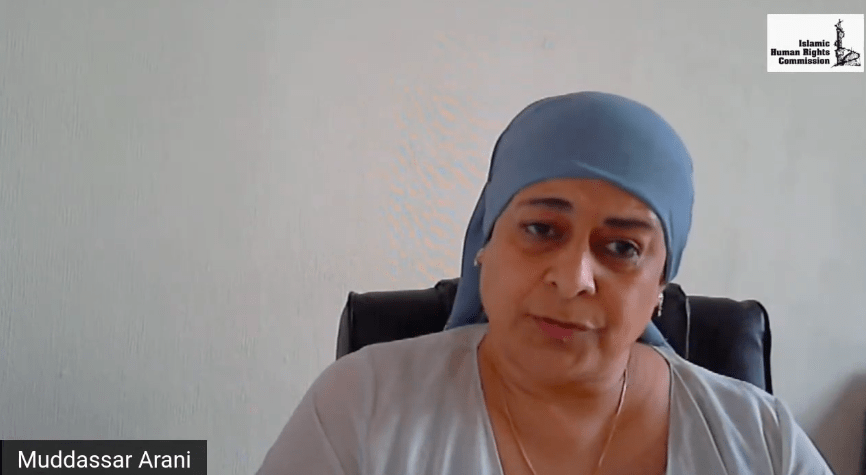
“The question that then comes to mind is, can children and adults support Palestine? Of course, you can. That is a right that every adult and child in this country has, a right to the freedom of expression. You are not abusing anything by exercising your rights. The next question is, can the child or adult say “free Palestine”? It is not a criminal offence, and it is absurd to claim so. What you are doing is exercising your right to freedom of expression.
Can a child or adult have a flag or badge of the Palestinian flag? Of course, we can. Children under Article 13 have that right.
Is a child being racist if they merely say, ‘free Palestine’, or they support Palestine, or they are being critical about the atrocities taking place? No, because you are exercising your freedom of expression, just like every other adult in this country with that right.
You have to right to freedom of expression, they are limited but if you exercise those rights responsibly, and you are not causing racial hatred, malicious communication, then you are exercising your legitimate right which exists in accordance to the law in this country.”
Raza Kazim (teacher) began his presentation by offering an anecdote:
“I was informed by a year 10 pupil from Challney High School for Boys that the headteacher at their school held an assembly, warning students that if anyone was caught on the school sites talking about Palestine amongst each other or with any staff member or wearing anything related to the “conflict”, there will be consequences. The pupils were told that it will be seen as anti-Semitism and it will not be tolerated. When the assembly concluded, all the boys shouted out ‘FREE PALESTINE!’.”
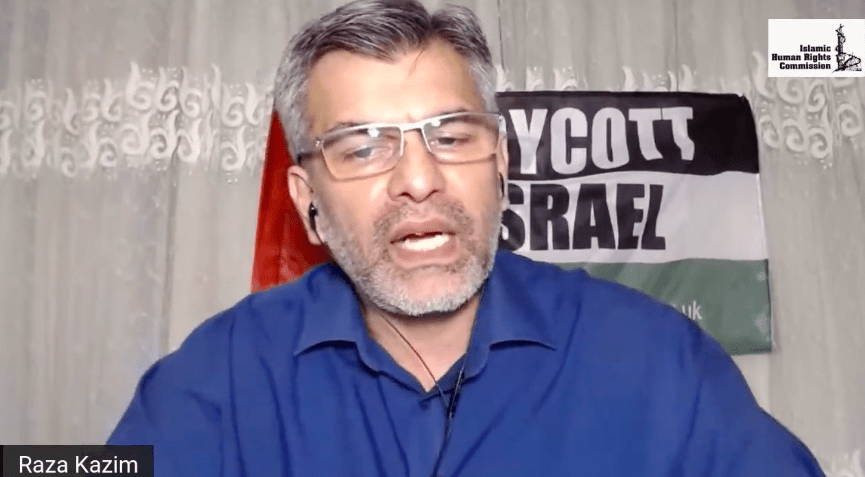
“I choose to name this school because it is not the first time that this school has suppressed the rights of Muslim children to express their political views on the issue of Palestine. You may be aware of the Prevent duty which is controversial to say the least. This school reported the child to Prevent and to the police due to the child being vocal on Palestine. The boy had been wearing a ‘free Palestine’ badge and had ask the school canteen to not stock items from companies that support the Tel Aviv regime. This resulted in the police going to the home of the pupil with large A4 files; the purpose was not only to intimidate the child but also the family. The school must stop its anti-Palestine stance and allow its students the space to express political views. After all, schools are preparing them for the realities of the world, and it is essential for them to learn what they are passionate about.
The legislation of Prevent is being implemented by schools and probably has been the reason for so many teachers reacting negatively to pupils expressing solidarity with Palestine. For pupils, it is their fundamental right to express things politely, courteously and respect everyone, but speak the truth. If pupils want to ask their school to stop stocking any items that are part of the Coca-Cola or Nestle brand, two companies that support the Tel Aviv regime, if the school refuses to listen, then you can encourage other pupils to not buy those items, you’ll be perfectly within your rights to do that.
I tell these stories about schools because they crystallise how the schoolteachers have become weaponised through the Prevent duty by the security apparatus of this state, into making Britain into a police state. The people of the Stasi East German state were ashamed of doing such things, whereas here the schools have embraced it, in some cases deliberately although it is a statutory duty, in some cases unwittingly or unknowingly, and in other cases, unwillingly because they feel they have no agency. I know as teachers we can make a difference.
I came into the teaching profession to help kids grow their potential, to critically analyse information, to think critically about the propaganda of the media, politicians and of people in authority in general, and have the wherewithal to discern between truth and lies. I wanted to have a classroom that would be a safe space for them, to make mistakes and to learn from their mistakes and to channel their passions.
The issue of Palestine is not neutral. I cannot be neutral when I see the destruction of hospitals and schools and killing of children over decades. One moment that recently stood out for was when a Palestinian father swapped two of his children with those of his brother so that if one of their houses was bombed and one family was wiped out, at least some of their children would survive. It was heart wrenching. Israel is an occupying power; for 73 years the nature of the oppression may have changed, but what does not change is who the oppressor and who the oppressed is. In order for pupils to understand the details of the issue, they need to hear the other side. The one thing you cannot do in dealing with this issue is divide it into Jew and non-Jew. We have people attending the rallies and, on this webinar, people of faith and no faith, Jewish and Muslim backgrounds and yet we all believe in a free Palestine.
I have seen a letter issued by Redbridge council and heard about others, saying that schools are not political spaces – that has always been used by authorities to neutralise expression and somehow, show that they are only interested in neutral education. We’ve seen protests by pupils in a school in Pimlico where similar arguments were attempted by people in authority. This type of thinking is disingenuous and should be challenged by parents. There are plenty of political agendas pushed by schools. The issue of Palestine can be brought into the school curriculum, into geography, in citizenship, in maths, in history. Teachers are creative people; they can bring things into the curriculum that will engage students in constructive dialogue and discussion.
Palestine is an opportunity for people of different backgrounds to unite and consider the principles that are important.”
Massoud Shadjareh (Chair of IHRC):
“The Zionists and Israeli government and its supporters have been working hard for my lifetime to equate Judaism with Zionism, to equate Israel with all Jewish people, to say all Jews support the state of Israel, therefore if you challenge Israel, you are challenging Judaism and therefore being anti-Semitic. That is a fallacy that people from the secular and Jewish communities that have shown this is a myth. It is being done because they want to weaponise anti-Semitism and silence people. There was a huge attempt of this in the 2001 Durban conference which backfired and passed the resolution and Zionism is a form of racism. Now it is being taken further, that to be in solidarity with Palestine is a form of anti-Semitism. The UN has very clearly identified that there is an illegal occupation of Palestinian land, so to say ‘free Palestine’ is to say remove illegal occupation. If our politicians are truthful to the principles they claim to adhere to, they should be shouting ‘free Palestine’ too.”
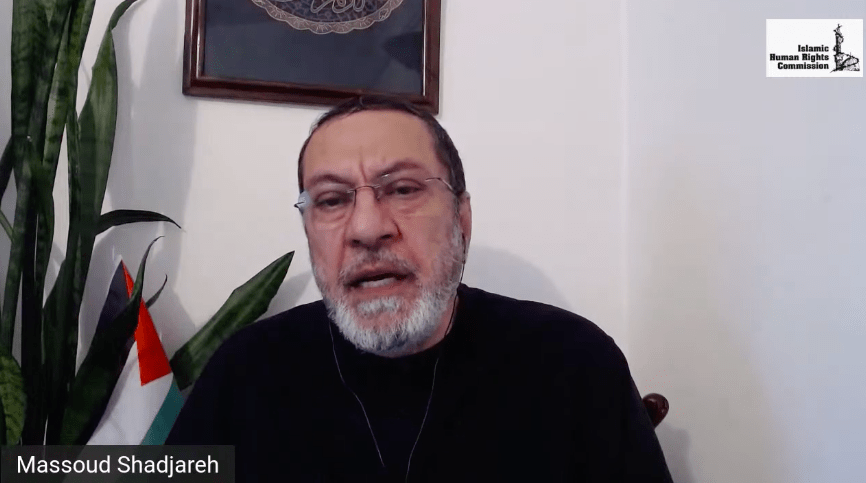
“To silence people who simply identify there is a Palestine and say this is anti-Semitism and racist, is absolutely outrageous.
Look at the recent footage, whereby Zionists organised a rally outside the Israeli embassy, there is no Palestine, it is all ‘their’ land – what does that mean? That message means a denial of the existence of Palestinians by those are supporting illegal occupation means they are supporting ethnic cleansing and genocide. We have a duty to say free Palestine; those complaining and calling this anti-Semitic, in their books, there is no good Palestine supporter.
We at IHRC have over 20 years of experience in advocacy and in our legal department. We are offering our services to all those who’ve been affected by these witch-hunt and silencing people. We see what the Zionist supporters, not just in the streets of occupied territories but also in the streets of London. For those that support Palestine, we are on the right path, we are standing for justice, against racism and apartheid and we will not pick up the racist, barbaric terminology that they use. We are standing to create a better society with our fellow Jews, Christians, and members of our communities that come from secular backgrounds. To do this we need to challenge the racism and apartheid, and I urge everyone to rise up for Palestinian justice. It is not just students being put under pressure, it is also our teachers, university lecturers, university students, and people in different professions to silence anyone that show their support with Palestine and challenge the illegal and apartheid system. We will support anyone that will be attacked.
Speakers discussed the following in the Q&A session: how to encourage children that do face intimidation in their educational institutions, how can encourage students to be critical and challenge their teachers, giving people the confidence to exercise their rights and articulating their rights when they are confronted, the importance of parents to be aware of their children’s rights, accessing the assistance that is available to people, the importance of knowing the facts and being articulate and accurate about them, how do teachers teach students about the things people do not want to discuss, for example Churchill comparing Palestinians to dogs and how to organise information about rights to students and parents.”
